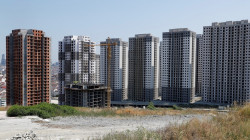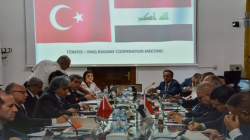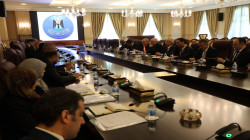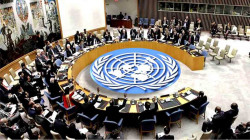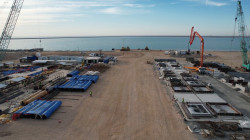Iraqi-Turkish "Development Road" gains strategic significance amid "proxy war"
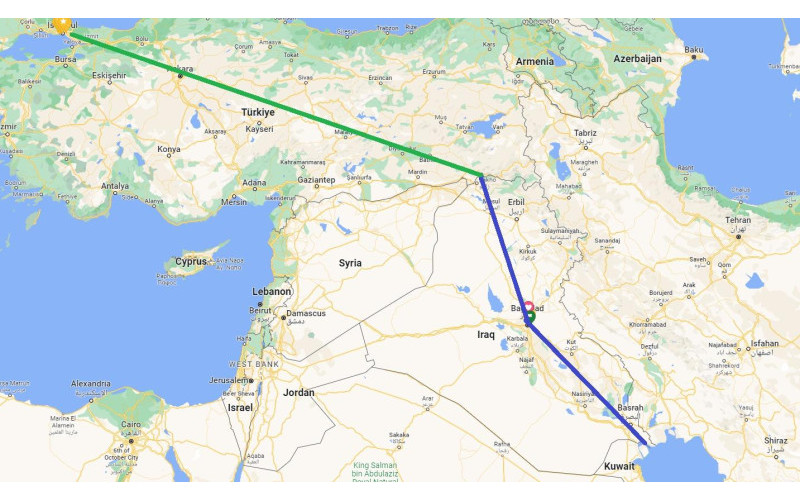
Shafaq News / In the complex tapestry of regional geopolitics, Iraq's "Development Road" initiative, first proposed by Prime Minister Mohammed Shia Al-Sudani during his diplomatic visit to Ankara a year ago, has emerged as a beacon of strategic importance.
Against the backdrop of escalating tensions and what some term a "proxy war," the project assumes heightened relevance, particularly in light of disruptions to maritime navigation along critical routes like the Bab el-Mandeb and the Red Sea—vital lifelines facilitating around 15% of global trade.
With anticipation building around the imminent visit of Turkish President Recep Tayyip Erdogan to Iraq in the coming days, the "Development Road" project is poised to take center stage. This initiative envisioned as a transformative transportation corridor, garners increased attention as both Iraq and Türkiye seek to bolster regional connectivity and foster economic growth.
In this intricate geopolitical landscape, Erdogan's longstanding vision of positioning Turkiye as a pivotal nexus for energy and trade finds resonance with Al-Sudani's ambition to leverage Iraq's strategic geographical position, rekindling its historic role as a bridge between East and West.
Moreover, recent disruptions in maritime trade, notably the downturn in activity at Israel's port of Eilat—a linchpin for Red Sea access—highlight the fragility of regional commerce amid heightened tensions.
Israeli estimates indicate that "the port has incurred an 85% decline in its operations. Plans are currently underway to lay off half of the port's workforce, a consequence of the onset of hostilities initiated by the Houthis in November."
The Houthis have waged a campaign targeting Israeli ships and those affiliated with Israeli companies or involved in Israeli trade.
With approximately 75 ships reportedly targeted thus far, according to the Houthis, or more than 50 ships according to American sources, maritime traffic through the Bab el-Mandeb strait, onward to the Red Sea, and further to the Suez Canal has been severely hampered.
Notably, this route was frequented by over 21,000 ships annually before the outbreak of the Israel-Gaza war and the Yemeni involvement, within the framework of what is termed the "Axis of Resistance," in defense of Palestinians.
All groups within the Axis (Houthis, Lebanon's Hezbollah, Islamic Resistance in Iraq) have declared that their attacks will persist until a ceasefire is achieved in the Gaza Strip, where Israel's actions have resulted in the deaths of over 32,000 Palestinians, predominantly children and women.
While it is true that the Houthis recently announced their intention to exempt Chinese and Russian vessels from missile and drone attacks, this declaration has had little tangible impact on the cost of maritime operations in the region.
Global insurance companies assert that shipping costs in the area have skyrocketed to unprecedented levels. This surge is attributed to several factors, including increased insurance premiums due to heightened risks, such as insurance covering vessel structures, cargo, protection, and compensation.
According to international estimates, maritime insurance costs have indeed escalated between five to tenfold compared to pre-war levels.
This figure has been exacerbated by the expanded scope of Yemeni targeting, which no longer solely focuses on Israeli-affiliated vessels but also encompasses American and British ships.
In response, Washington and London formed a military coalition known as the "Operation Prosperity Guardian" alliance to counter Yemeni attacks.
For shipping companies, the losses could be significant. In addition to rising insurance premiums, costs have escalated since ships no longer traverse the Bab el-Mandeb and the Red Sea, necessitating longer voyages around the African continent via the Cape of Good Hope.
This elongation of journeys, sometimes by 10 to 20 days, entails additional expenses for fuel, labor, and other resources.
Regardless, this maritime passage has lost the security necessary for trade. The immense maritime traffic between Asia and Europe, especially after Houthis' leader Abdul-Malik al-Houthi announced that the targeting scope would expand to pursue ships crossing the Indian Ocean, some 6,000 kilometers from Yemeni shores, further stifling these trade routes, which accommodate tens of thousands of ships annually.
As the circle of danger widens, the world is shifting its focus toward alternative and more secure routes in the present and future.
Consequently, observers suggest that projects like the "Development Road" would become increasingly attractive to trade movements between East and West if Baghdad and Ankara effectively promoted and solidified its success.
With resolving tensions between Iraq and Turkiye underway, the "Development Road" project is poised to become an inevitable choice for Al-Sudani's and Turkish governments to initiate and implement after studies have been prepared and execution plans laid out.
The project, known for its railway lines, highways, and the expansion of the Grand Faw port, will facilitate shipping operations between Asia and Turkiye via Basra to the Turkish border and from there to European territories.
According to information from Muscat, talks between the Americans and Iranians two months ago did not yield agreements on calming the "Yemeni front" or halting Houthi attacks on ships.
The Pentagon also states that its airstrikes in Yemen have not weakened the Houthis' ability to attack maritime traffic so far, as they seem determined to continue unless the war in Gaza ceases.
Observers note that the "Development Road," estimated at around $17 billion, represents a rare opportunity for Iraqis and Turks to advance their plans amid the tense atmosphere in the Red Sea and Suez Canal toward the project's success.

